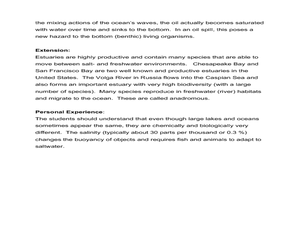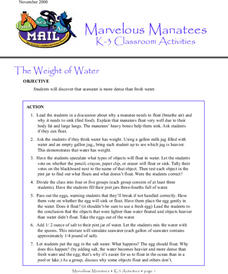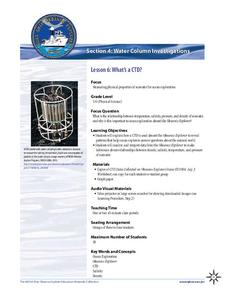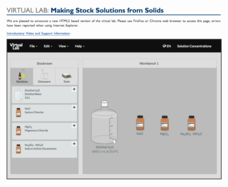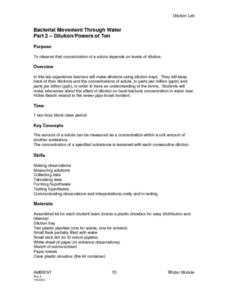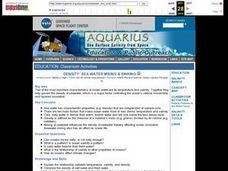Curated OER
Water Density and Stability Lab
Learners observe how different water densities and salinity control the depth at which different water masses occur. Submarines are used as a case study. This is a well-designed with an excellent worksheet.
Curated OER
Water Density Boundaries
Students create observable layers in water that represent a separation based upon density differences. They model density boundaries using differences in temperature and salinity. They, in groups, perform a meaningful experiment...
Curated OER
Teacher's Guide For: Water Temperature and Salinity Experiment
Students experiment with water density, temperature and salinity. For this water lesson, students observe how the coldest water sinks to the bottom of a test tube, and how saltwater sinks in comparison to freshwater.
Curated OER
Water World Story
Fourth graders write a story about how a drop of water may have traveled to school. They design a presentation on the water cycle.
Curated OER
Water Chemistry
Students engage in a lesson that is concerned with the concept of water chemistry. They conduct research using a variety of resources. Students also consider an experiment to observe how water has the abiility to exist as three different...
Curated OER
The Weight of Water
Students participate in an experiment about the weight of water. They work together to discover that seawater is more dense than fresh water. They also determine which objects float and sink.
Curated OER
Water Consumption, Pricing and Conservation in Utah.
Young scholars investigate the research report that measures the levels of water usage for Utah. They focus on conservation efforts that are currently being used. They reflect upon their own amount of water usage and research methods of...
Curated OER
Quiz on pH, Acids, Bases, Alkalis, Neutralisation and Salts
In this chemistry worksheet, students complete 5 multiple choice questions by selecting the correct answer from the drop down box.
Nevada Outdoor School
Let It Snow! Let It Melt!
Winter weather offers a great opportunity to teach young scientists about the states of matter. This activity-based lesson includes a range of learning experiences, from experimenting with the rate at which ice melts to singing a song...
NOAA
What's a CTD?
Why are the properties of the water important when exploring the ocean? Young scientists discover the tools and technology used in deep sea exploration in the fourth installment in a five-part series. Groups work together to examine...
Chemistry Collective
Virtual Lab: Making Stock Solutions from Solids
Combine a little solid and a little water and the solution is clear! An experimental lesson has individuals make calculations to create a sample solution of a given volume and molarity. They then create the solutions using a virtual lab...
Institute for Systems Biology
Introduction to Saline Environments & Microbial Halophiles
If you do not mind wading through unrelated headings (This is not for a physics or STEM course, as it states.) and content (The lesson opens with an article about neurology, not halophiles.), then you will find a valuable resource on...
Curated OER
Water in the Environment
In this water in the environment instructional activity, students match 10 terms related to water to their definitions. They identify 10 sentences as true or false related to groundwater, layering and landfills. They fill in the blanks...
Curated OER
Salinity Experiment
In this salinity experiment activity, students follow the procedures to set up an experiment about how salinity affects the weight of water.
Curated OER
Salinity
Learners define and discuss salinity, conduct classroom experiment to determine salinity of water sample by using hydrometer, record predictions, and demonstrate understanding of how salinity influences object's ability to float in water.
Curated OER
What is a River?
Young scholars study the various types of bodies of water: rivers, oceans, lakes and ponds. They observe models of each and then use clues to discuss how they are alike and different. They imagine they have found a new planet and draw...
Curated OER
Does salt have an effect on the temperature of ice?
Learners explore the effect that salt has on the temperature of ice. In this scientific inquiry instructional activity, students observe an experiment to see how cold ice can get when salt is added. Learners then explore how the ice...
Curated OER
Bacterial Movement Through Water Part 2- Dilution/Powers of Ten
Students make dilutions using dulution trays. They keep track of their dilutions and the concentrations of solute, to parts per million (ppm) and parts per billion (ppb), in order to have an comprehension of the terms. Students make...
Curated OER
Sea Water Mixing and Sinking
Students investigate the role of temperature and salinity in determining seawater density. They use a Temperature-Salinity Diagram to examine the effects of mixing on density.
Curated OER
Water Balance & Nitrogenous Waste Removal
Examine the structures of the kidney and then define the functions of the specialised structures. Every will find this powerpoint engaging, many of the images will present facts such as osmolarity of interstitial fluid and the negative...
Curated OER
Salinity in Mill Creek
Fifth graders use water samples collected at three different locations of Utah's Mill Creek to test salinity of water, hypothesize about salinity levels at each location, record results, and discuss their findings with classmates. ...
Curated OER
Salts
In this salts worksheet, students read how salts are created and how different acids make different salts. This worksheet has 1 graphic organizer and 7 short answer questions.
Curated OER
Ice Energy
Students explore how chemicals change water. In this chemical change lesson, students participate in an experiment to observe how salt effects ice and how ice cream freezes.
Curated OER
Acid, Base, or Salt?
In this acids and bases worksheet, students read about the differences between acids and bases and then complete a table comparing the characteristics of both. Then students determine if the given statements describe an acid, base, or...




